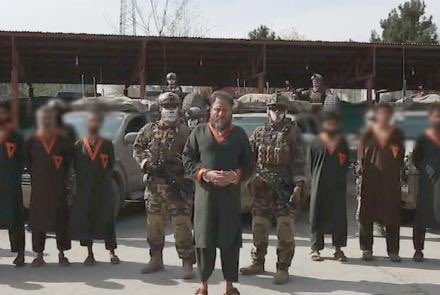The Afghan security forces arrested the leader of the Islamic State of Khorasan Province (ISKP), along with 19 other militants on Saturday, April 4. The arrest comes after a deadly terror attack on a Sikh temple, late in March, killed 27. The dastardly attack was claimed by ISKP.
Among the 19 militants arrested on Saturday, were two high-ranking commanders, other than Abdullah Orokzai, also known as Aslam Farooqi, a statement by Afghanistan's intelligence agency read, Al Jazeera reported.
Aslam Farooqi, leader of ISKP arrested

Farooqi, a Pakistani national, was earlier associated with Lashkar-e-Taiba (LeT), a Pakistan-based Islamic militant group. He later joined ISKP and assumed its leadership in 2018, after the death of Abu Saeed Bajawori.
Sikh temple attack
#ISKP leader Abdullah Orakzai, a Pakistani national known as Aslam Farooqi was detained in a complex operation by @NDSAfghanistan special forces. In initial investigations, he has confessed of strong relationship between Islamic State-Khurasan and regional intelligence agencies. pic.twitter.com/WdkOl8MTFQ
— Javid Faisal (@Javidfaisal) April 4, 2020
On March 25, an armed attack on a Sikh religious complex in the capital Kabul left 27 worshippers dead. Armed gunmen barged into the temple complex, shot the guard and opened fire at the worshippers. The attack was claimed by ISKP. All the attackers were later gunned down, in an operation by the security forces.
Less than 300 Sikh families live in Afghanistan, where they're often attacked by armed groups. In 2018, a suicide bombing on a Sikh and Hindu politicians' convoy, killed more than a dozen in the country's eastern Nangarhar province. Due to regular onslaughts, country's minority Sikh and Hindu population have sought refuge in neighbouring India, a Hindu majority country, with a large Sikh population.
Islamic State in Afghanistan
The country's fractured polity and long-lasting civil war have provided several militant and terrorist organizations, a breeding ground to survive. Islamic State of Khorasan Province (ISKP) -- the Afghanistan faction of ISIL, first established its stronghold in the country, in 2015. Since then, the group has claimed several deadly attacks in the country, mainly aimed at ethnic and religious minorities.
In recent months, the group has been separately targeted by the US forces and the Taliban, which has weakened it considerably. In November, last year, the Afghan security forces claimed that the group has been completely defeated in Nangarhar. Earlier this month, the group attacked a minority Shia gathering, in capital Kabul, killing 32.









